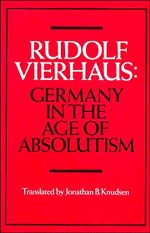1 - Economic Development
Published online by Cambridge University Press: 05 June 2012
Summary
PRELIMINARY REMARKS: STAGNATION AND RESTORATION
The economic depression after the Thirty Years War differed in intensity in the various regions of Germany and in the various sectors of the economy, but all in all it continued unabated for the next half century. The numerous measures at reconstruction had little long-range effect on the total economy, and it did not help that the economies in other European states were also stagnant. Prices of important agricultural products, most significantly of grain, declined from the second quarter of the seventeenth century until the second quarter of the eighteenth, and they remained at low levels. Though prices stabilized earliest in Germany, they were still not able to approximate prices at the beginning of the seventeenth century. Lower prices reduced living costs in the cities, but they also lowered agricultural income. In addition, agricultural wages followed these tendencies only with hesitation. Demand for agricultural products also slackened with the reduced rate of demographic growth in large parts of Europe, particularly in Spain and northern Italy, in the Netherlands and Poland. This pattern only began to change fundamentally from about 1750 when rapid and general growth set in once again. (The estimated population in Europe, including Russia, was approximately 80–85 million in 1500,100–110 million in 1600,110–125 million in 1710,120–140 million in 1715, and 180–190 million in 1800. The latter growth meant that the rate doubled in the last half century.
- Type
- Chapter
- Information
- Germany in the Age of Absolutism , pp. 12 - 30Publisher: Cambridge University PressPrint publication year: 1989



